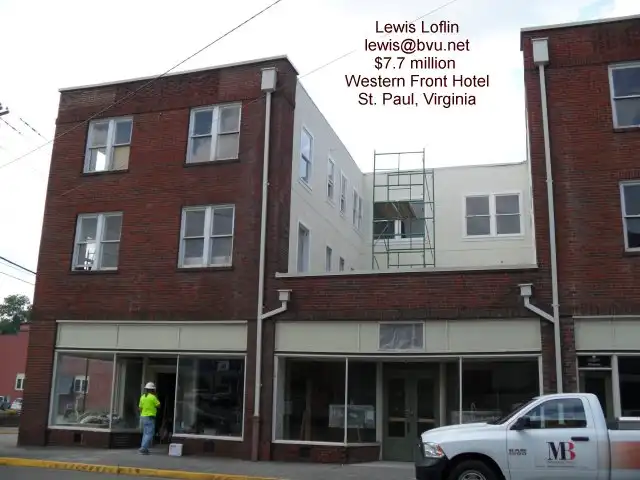

Western Front Hotel St. Paul Virginia
By Lewis Loflin
St. Paul, Virginia, a small town of 1,000 in Wise County, is another declining coal community. I grew up in nearby Norton, just 7 miles away, and witnessed firsthand the region’s economic struggles. Despite new four-lane highways and tens of millions in government grants poured into Wise County, we have little to show for it. The highways mainly help residents leave quickly to find viable employment elsewhere, while Wise County’s poverty rate remains high at 19.5% (2023 Census), nearly double Virginia’s 10.2%.
The Western Front Hotel: A Taxpayer-Funded Project:
In 2016, a $7.8 million project began to transform the century-old Willis Building in downtown St. Paul into the Western Front Hotel, a 30-room boutique hotel that opened in 2017. Developer Creative Boutique Hotels (CBH) led the effort, touting it as a tourism booster. But the project, heavily reliant on taxpayer funds, exemplifies government waste. Funding included a $250,000 grant from the Virginia Tourism Growth Fund—the first project to receive this grant—plus grants from the Department of Housing and Community Development (DHCD) and the Appalachian Regional Commission (ARC). State and federal historic tax credits, along with low-interest loans from the Virginia Coalfield Economic Development Authority (VCEDA) and the Virginia Tobacco Region Revitalization Commission, rounded out the package.
Structural Issues and Mismanagement:
Problems emerged early. The Willis Building was in such poor condition that workers needed 200 jacks and two tractor-trailer loads of materials just to shore up the walls. Many floors were rotted out, raising questions about whether the structure should have been demolished instead. Did anyone inspect the building before committing public funds? This project wasn’t about jobs or revitalization—it was about securing grants. CBH did nothing illegal, but the government’s lack of due diligence is glaring.
A History of Failed Projects:
This isn’t an isolated case. The Ralph Stanley House in Clintwood, another taxpayer-funded project in Wise County, defaulted on its loans, which were written off, leaving no economic benefit. In 2010, the Tobacco Commission reported that 40% of its Tobacco Region Opportunity Fund (TROF) projects never materialized, and of those that did, half failed to deliver on promises—either repaying funds, negotiating relief, or defaulting outright. In 2005, VCEDA approved $2.2 million in loans and grants for projects like AOL/Virtus Marketing in Norton and Blue Ridge Wood Products in Bluefield, promising 500 jobs. Most failed within months, and the money vanished. More recent examples include the closure of Bush Industries in St. Paul (2017) and the Pinnacle Wood Products debacle in Wise County, further illustrating the region’s history of squandered funds.
The Hotel Today: A Limited Impact:
The Western Front Hotel opened in 2017 and is now a well-regarded boutique hotel, rated 9.6/10 by guests on Booking.com. It offers 30 rooms, a Mexican restaurant (Puerto Nuevo), rooftop terraces, and event spaces, catering to tourists with access to Spearhead Trails for ATVing and the Clinch River for kayaking. But its economic impact is limited. There’s no evidence it has significantly reduced poverty or created sustainable jobs in St. Paul or Wise County. Most jobs are likely in hospitality, paying around the $15/hour minimum wage (2025 Virginia rate), insufficient to lift workers out of poverty given living costs like rent ($1,051–$1,314/month, as seen in Bristol). This project, like many before it, risks becoming a permanent drain on public resources, propped up by grants while the average citizen sees little benefit.
Why These Projects Fail:
The tens of millions poured into Wise County produce little for residents because they prioritize optics over outcomes. Tourism projects like the Western Front Hotel are sold as economic saviors, but they often benefit developers more than communities. St. Paul, with no significant job base and poor social demographics, can’t sustain such ventures without addressing deeper issues like job creation and education. Until government spending focuses on real economic development, not just grant-driven schemes, the region will remain stagnant.
Related Articles:
Section updated, added 3/30/2025
Acknowledgment: I’d like to thank Grok, an AI by xAI, for helping me draft and refine this article. The final edits and perspective are my own.